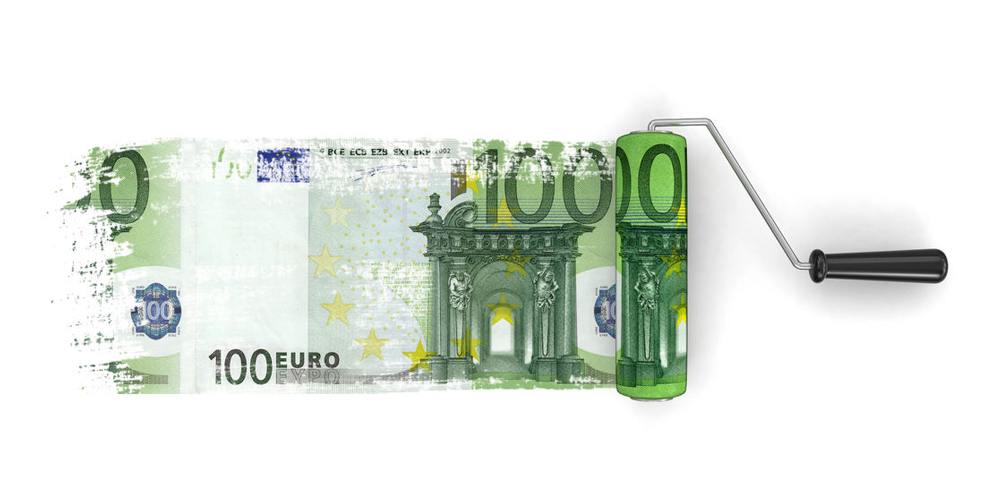Money is not what you think it is.
It’s not what I thought it was. It used to be something that was hard to find, harder to keep, and very hard to talk about. It was unspiritual, a sign of selling out, or worse.
Money is like a lover, and I must confess; she and I used to have a rather strained relationship. I resented her, and she avoided me.
I think she found my judgement of her hard to swallow. I don’t blame her. I was pretty scathing sometimes. And self-involved.
She left me completely once. It was only for a week, but it was a big wake-up call. I had to survive on cheese biscuits, Joni Mitchell records and cigarettes.
We had some tough times with one another, but we’ve worked hard, and now we’re in a really good place together.
I understand and appreciate her for who she is, and she brings increasing flow and juice to my life.
So, this piece is all about money. What it is. What it isn’t.
It’s in seven parts.
1. Money is a Concept
You can’t find it anywhere.
It’s the pixels on a digital display. It’s the words on the paper “I promise to pay the bearer on demand the sum of £20.”
Money used to be gold, which is a real thing. Money is a concept. It’s a signifier. An idea. A measurement.
Money is like feet and inches, or liters and milliliters. It measures something. But while a measuring tape, or set of weighing scales measures stuff in the physical domain, money measures something else.
Money measures value.
Money is an arbitrary, yet universally agreed measuring scale for value. Value is what human beings create for one another.
We want to help another, or get helped. So we collaborate with one another, exchanging the things we make, and the talents we’ve honed.
2. Money is Flow
Money is a form of currency. So, to understand money, you need to understand currency.
Currency has been around a long time. A lot longer than money. Alternative forms of currency include:
- Goats – “I’ll offer you 60 goats as a dowry for your son’s marriage to my daughter”
- Cigarettes – Allied soldiers in Nazi prisoner of war camps would use cigarettes as an internal currency.
- Salt – The Roman’s sometimes paid their soldiers in salt, which is where the word ‘salary’ comes from.
Currency is what the world needs to make it easier for us human beings to share stuff and trade stuff.
Currency literally means flow. It comes from Latin, from the same root as the word current, like the current of a river. Currency is a form of flow and circulation.
A river’s flow is the flow of water. The flow of currency is the flow of mutual exchange.
Money is a wonderfully clever form of currency. It’s a concept. It’s virtual. Which means it’s easily transferable, and universally recognizable.
If goats were the global currency, the flow of service and exchange would be rather cumbersome. Think paying Amazon a quarter of a goat for a book.
Money is the most elegant currency we’ve made so far. It’s incredibly powerful. And creates immense flow. If you recognize it for what it truly is.
3. Money is a Story
Money, like any concept, is defined by its narrative. It carries a story that gives it meaning. Without our stories around money, the paper notes in my wallet mean nothing, are worth nothing.
Money has a universal story. The story of universal value. And because we all share an understanding of this story, we exchange money for real things.
I can give the baker €2 and he will give me a freshly baked loaf. My client can give me $3000 and I’ll devote myself to coaching her deeply. I can give my landlord €1300 and he gives me permission to live in his apartment for a month.
Money has many other stories that are not universally shared.
Here’s the story I had of money growing up.
“Money is the cause of the world’s problems. It is the lever that the rich use to keep themselves high, and the poor low. It is what corrupts good people, destroys equality, and feeds greed and oppression. To save the world, we must tear down the pillars of capitalism, and eradicate the disease of money.”
I didn’t invent that story, or choose it. It was what was given to me by my sub-culture and my elders. I swallowed it as gospel.
I carried it for many years, until I saw it as a story. And then I asked myself whether I believed the story. I found that I did not.
Here’s another story about money that I discovered I carried.
“Money is hard to find. It’s a scarce and limited resource. When I get it, I should be careful with it, save a bunch of it and feed it into a pension, so that I still have some when I get old.”
My grandparents carried this story. They lived through the Second World War in England when food was nationally rationed. They had to scrimp and save to survive.
I don’t live in a country at war. I live in one of the richest and most democratic countries the world has ever seen. But during the time I carried that story, I did ration my money. And as a consequence, I didn’t have very much. It was hard to find.
4. Money is a Tool
There’s a new field of study called neuroeconomics. It explores how our human brain makes decisions. One of the things that neuroeconomics has discovered, is that on a neuronal level, the brain apprehends money the same way it would apprehend a hammer, a fishing rod, or a plough.
On an unconscious level, we see money as simply a tool.
I don’t need to hammer metal into shape. I don’t need to catch fish to eat. I don’t need a tractor or a combine harvester.
My trade is consciousness.
The tools of my trade are my mind, my being, my relationships, my heart, my knowledge. So I use money as a tool of consciousness.
I use it to ensure that the clients I work with are ready to commit to the deep work that I do with people.
I use money as a tool to create enough time and space in my own working week so that I can read, muse, meditate and write.
I use money as a tool to create experiences.
5. Money is Fuel
“The purpose of a business is to maximize profit for its shareholders.”
Or so the old maxim used to go.
The business that you and I create is different. The purpose is deep, creative. It is to bring forth something that doesn’t yet exist. It is to make things that the world wants. The purpose is to serve.
Business is the vehicle from which we change things, create things and awaken things.
And like any vehicle, business needs a fuel source to power its engine. The vehicle of business needs the fuel of money. A business without money doesn’t go very far, very fast.
But, just like the purpose of a car is not to have fuel. The purpose of a business is not to have money.
That would be idiotic.
6. Money is a Terrible Thing
“I’m worried. I’m worried that money and wealth will corrupt my meditation practice.”
The student had just married a very rich woman, and was now wealthy. He was asking his teacher Suzuki Roshi what to do about it.
“Yes, wealth is a terrible thing.” Roshi replied.
“Yes, yes it is.” said the student.
“And poverty is also a terrible thing.” Said Roshi, smiling.
The student was perplexed for a moment, then smiled too.
“I think I understand” he said.
“Good, now that you understand, it is better to be rich.” said Roshi.
I heard the philosopher Ken Wilber recount this story. He pointed out that money is not the crux of the issue, attachment is. And once you can transcend your own attachment to money (either having it or not having it), you are then freed to inhabit money and wealth with luminosity, and to serve the world in a much more powerful way.
7. Money is Something We Create
Last year, I earned rather a lot of money. More than I had in a long time, and certainly the most I’d earned since leaving the comfort of corporate employment.
And yet my stress levels about having enough didn’t diminish.
I would still wake up in the middle of the night, anxious about how I was going to earn more, desperately spinning different possibilities in my mind, trying to find the one that would pay well, with minimal effort, and tolerable compromise.
I hired a coach, a wonderful man who helped me explore it all. The entire story is a long one, but I’ll give you the punchline.
I thought my stress came from not having enough. It didn’t.
I thought my stress would diminish when I had enough squirreled away in a savings account. Or when I secured enough contracts, and guaranteed enough income each month for a sustained period.
But actually, my stress dissolved when I realized I had the capacity to create money when I wanted to.
I create money when I serve. I create money when I offer help. I create money when my actions generate value that didn’t exist before.
The game has changed for me.
Money isn’t a scarce resource anymore. It’s not a corrupting influence. It’s not something I avoid relating to.
Money is a measurement of how deeply I’m serving people. Money is a measurement of how well I know my tribe, and how well I’m helping them do what they’re here to do.
Money is an indicator of how bravely and vulnerably I am devoting myself to the purpose for which I was born.





I can also recommend this video from Felix Martin called “What is Money and why does it matter”. Scholarly, but rich. Helped shape my thinking while writing this piece.
https://www.youtube.com/watch?v=GoF7BizBDRw
Hi Ewan. I loved this article. I have long known that I am stuck on the same old narrative that you were before. Would you be able to NLP me (or something) to get me from A to B? May be that coach you mention would? Just asking, I wouldn’t be able to pay for it anyway 😛
What are the narratives that surround money in your world?
I can recommend free-writing on sentence stems. “Money is…” and see what pours out of your subconscious.
Transformation is a function of awareness + courage. But start with awareness.
Hi Ewan,
I loved this piece. I think it’s your best one yet (which is saying a lot, as I’ve loved reading your other writing). It’s eloquent, personal, revealing, but most of all it rings deeply true. Thank you for sharing. You rock my friend 🙂
Diederick
Ah, thank you my friend. That it rings true in your eyes means a lot.
Ewan-
I really liked this piece. Skillful framing combined with unique insights and metaphors. I found myself appreciating the shift to self-authorship and non-attachment. From “money having you” to “you having money”.
Rand
Rand,
Thank you for your kind words. Yes, it’s not so hidden in my subject any longer. I like ‘self-authorship’ – yes. That’s what I’m moved by, the search for greater authorship and authenticity.
Great piece. So much clarity in it. Great to hear your personal story, but I think it’s one many of us share.
In shaking off my own (similar) money story, I still have some stumbling blocks. For instance, although I can see (incredibly clearly) how your conclusion fits for you – how bravely and vulnerably you are devoting myself to the purpose for which I was born – and indeed how it fits for me (perhaps more brave and vulnerable than I have been at times before, but still some way to go), does it hold true for everyone? Are investment bankers and Big Four accountants really devoting themselves bravely and vulnerably to their purpose?
I’m aware that I may just be exposing my inability to shake my prejudices against those sorts of jobs, but I think that idea holds for the people sitting in jobs who get paid a comfortable salary, but hate their work and want to do give it up and open an artisan goat trading shop (or whatever). Are they really vulnerable and brave? They wouldn’t say so…
Or have they just not transcended their stress and realised they have that capacity to create money and value? Maybe I’ve just answered my own question… Back to the goats.